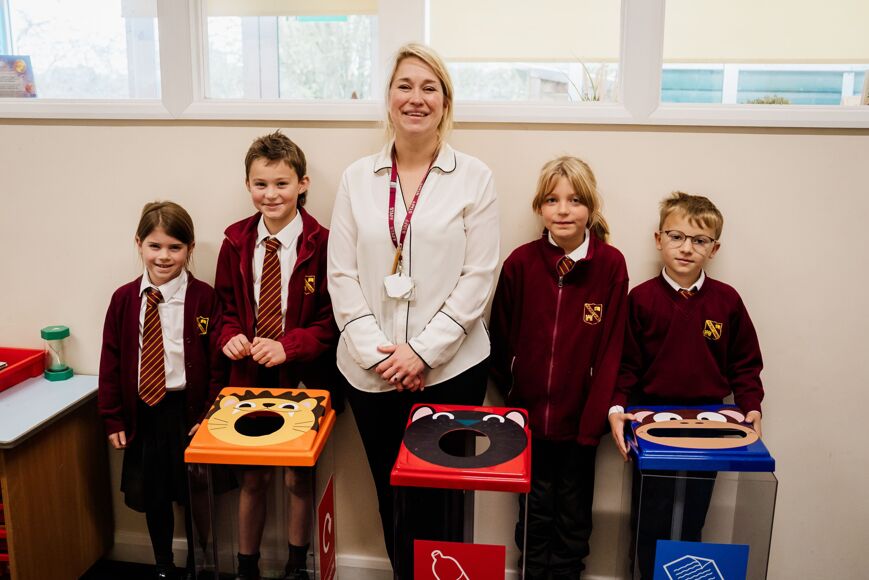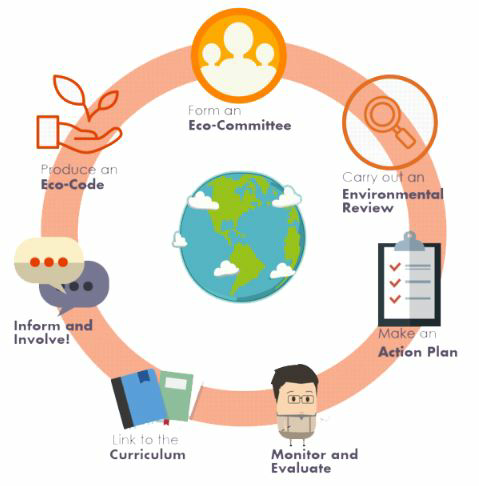- Home
- Enrichment
- Eco - Heroes
Eco - Heroes

During the last academic year, Pyrcroft Grange primary school has aimed to improve the environmental awareness of our children and empower them to drive change within our school and local environments. We have become a committed Eco School, having recently achieved our Green Flag award with merit with the help of our class Eco Heroes.
Each class throughout the school has two Eco Heroes who are responsible for helping to monitor the energy usage and recycling within their classrooms. The Eco Heroes meet at least once a half term to feedback and discuss the school’s environmental performance. We have conducted an environmental review of our school and the grounds and have outlined an action plan to improve environmental awareness around the school.
This academic year we hope to recruit some new Eco Heroes and continue the fantastic work we have started on monitoring and evaluating our school’s environmental next steps.
| Our Eco Heroes | |||
|---|---|---|---|
| Year 1 | Year 2 | ||
| Emily | Harry | Deacon | Zeynap |
| Year 3 | Year 4 | ||
| George W | Ada | Jett | Madison |
| Year 5 | Year 6 | ||
| Meredith | Georgie | Lexi | Bella |
| KS2 COIN | |||
| Louis | |||
About Eco-Schools
Eco-Schools is a global programme engaging millions of children across 64 different countries, making it the largest environmental schools programme in the world.
The programme is pupil-led and encourages whole school involvement. It also encourages closer links between schools and their communities. It offers many benefits for individual pupils, developing their knowledge and skills and improving their well-being. There are also many benefits for schools, with an added bonus of saving money.
How It Works
The Eco-Schools Programme follows a very simple international Seven Step process that forms the criteria for the Eco-Schools Green Flag Award. Along the way, your school can achieve a Bronze Award, followed by a Silver Award, through self assessment. This provides recognition of the work your pupils have done towards their Eco-Schools Green Flag.
The Eco-Schools Programme is pupil-led; involves hands-on, real-world learning and gets the whole school and the wider community involved in exciting environmental projects. The programme covers ten topics. Schools must cover one topic for the Silver Award, three topics to gain a first Green Flag and five topics for Green Flag renewals, every two years. All topics can be easily incorporated into school life and curriculum regardless of the age of your pupils.

The Eco-Schools Topics
| MARINE | |
 |
How does what we do in our schools, homes and streets affect our seas? Our NEW marine topic helps you and your students understand our impacts on the world’s oceans and how we can make positive differences for our seas. |
| BIODIVERSITY | |
 |
Although it is extremely hard to determine the exact number of species that we share the planet with, we know that it is a lot and that there is great diversity. How do you promote Biodiversity at school? |
| ENERGY | |
 |
School’s have two main uses for energy: heating and electricity. Can you address both to help lower your school’s impact on climate change? |
| LITTER | |
 |
In the same way that Keep Britain Tidy sees litter as a symptom of wider social problems, OFSTED see litter as a sign of students’ respect (or lack of it) for their learning environment. Is your school litter-free? |
| WASTE | |
 |
Waste comes in many different forms – food, paper, electrical, metal – it can all be reduced, reused or recycled. How can your school manage waste better? |
| TRANSPORT | |
 |
Schools can do a lot to improve the way their staff and pupils travel. Can your school encourage pupils to try new modes of transport? |
| WATER | |
 |
Water; the stuff of life. What can your school do use this precious resource wisely? |
| SCHOOL GROUNDS | |
 |
A school’s grounds are a fantastic environment in which to let the imagination run wild. How will your school make the most of its outside space? |
| HEALTHY LIVING | |
 |
People are part of the environment. We want both to be healthy. How does your school promote choices that are good for us and good for the environment? |
| GLOBAL CITIZENSHIP | |
 |
Join our International Eco-Schools Twinning Programme |



